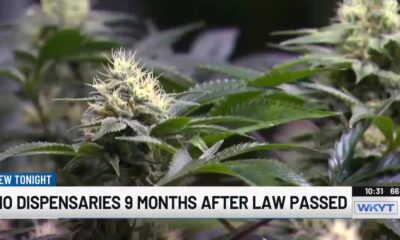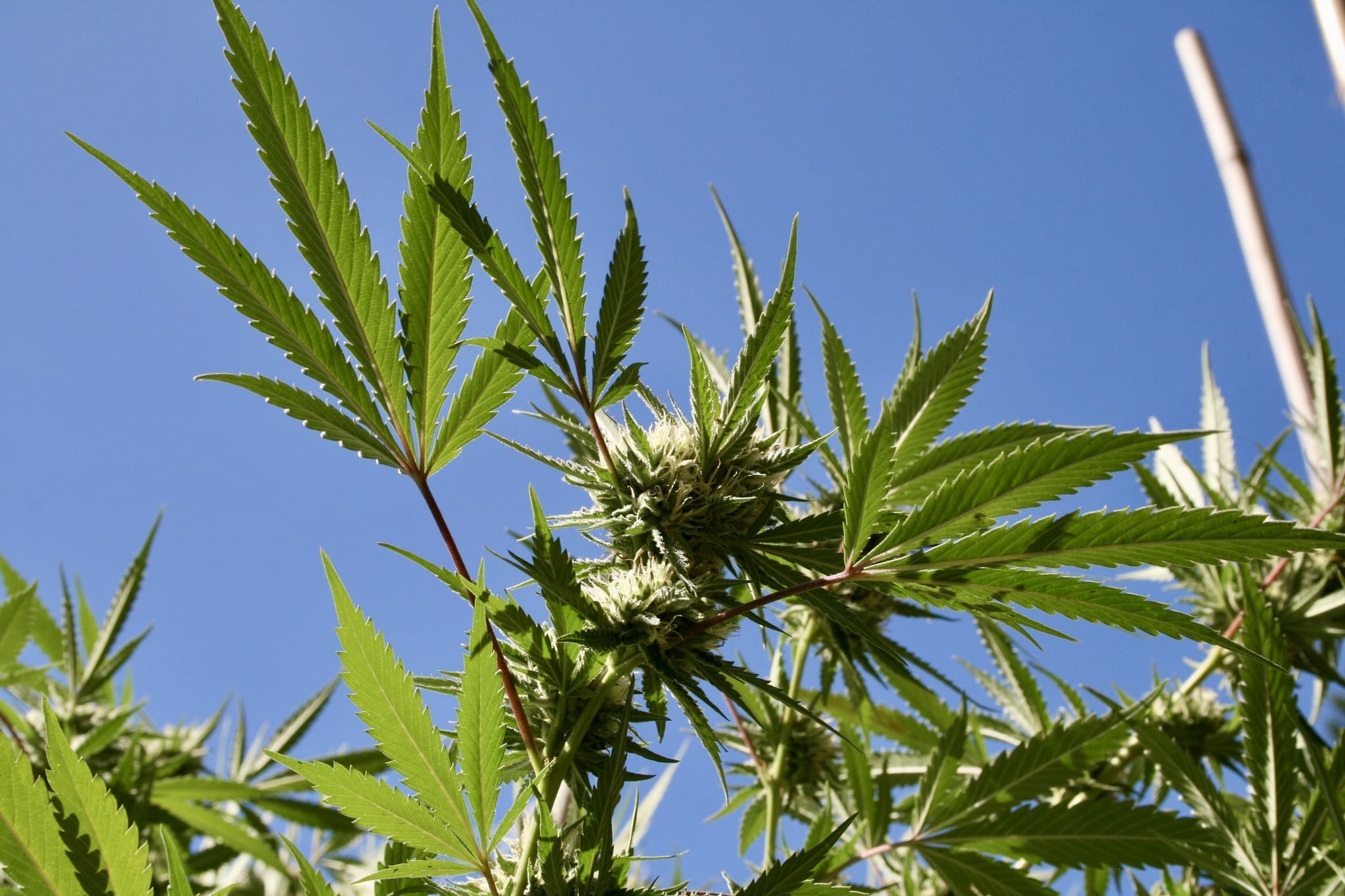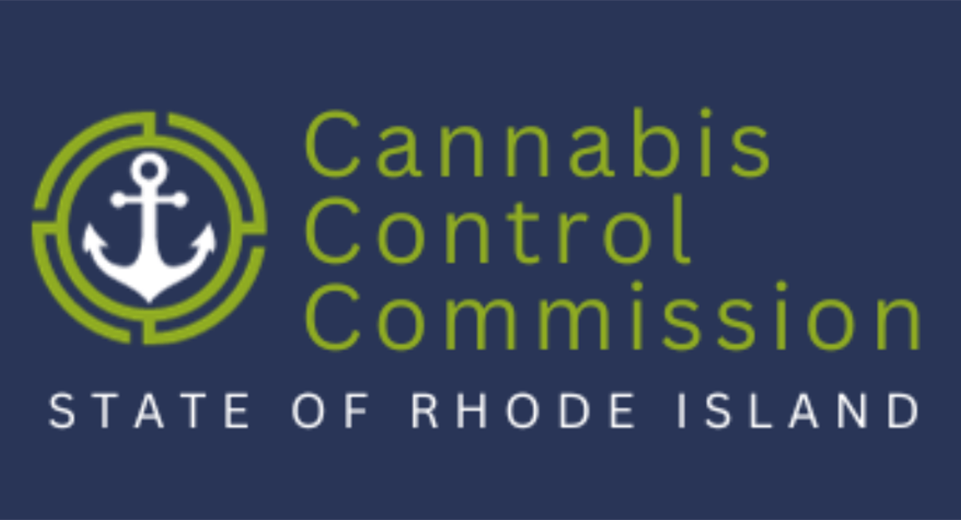featured
GOP Senator Is ‘Confident’ Psychedelics Access Will Expand Under Trump, Saying Many Veterans Speak To Him About The Benefits
Published
3 weeks agoon

A GOP senator says he’s “confident” that, under the Trump administration, lawmakers will help secure alternative treatment options for military veterans—including access to psychedelic medicine, as multiple veterans have personally requested from him after disclosing they’ve travelled abroad for the novel therapy.
And according to a U.S. Department of Veterans Affair (VA) official, a bill the president signed into law this year will streamline research into the therapeutic potential of Schedule I substances like psilocybin and MDMA.
During a Senate Veterans’ Affairs Committee field hearing in Alabama on Friday, Sen. Tommy Tuberville (R-AL) discussed efforts at VA to promote such research, with about a dozen ongoing clinical trials into psychedelics.
“VA Secretary Doug Collins said himself that the VA is continuing to look at new alternative treatments. As a member of this committee, I look forward to working with him and get this done,” Tuberville said, adding that under Collins, U.S. Department of Health and Human Services Secretary Robert F. Kennedy, Jr. and President Donald Trump, he’s “confident” that the country “will see generational change at the VA for our veterans struggling with their mental health.”
The senator later disclosed that that “veterans come to my office quite often,” and they’ve told him they’ve “gone to another country and a certain drug has helped,” referring to psychedelics like ibogaine.
Witnesses at the hearing, which Tuberville chaired in his home state of Alabama, included an official with VA, Veteran Mental Health Leadership Coalition’s Adam Marr, Compass Pathways’s Steve Levine, the University of Alabama’s Jim Wright and Spinal Cord Injury & Diving Innovation’s (SCI-DI) Brian Schiefer.
Ilse Wiechers, deputy executive director at the federal Veterans Health Administration (VHA)’s Office of Mental Health, said the agency is “exploring the therapeutic potential of psychedelic compounds like MDMA and psilocybin,” with a focus on serious mental health conditions such as “PTSD, major depressive disorder, generalized anxiety disorder and substance use disorders.”
“These therapies remain investigational, and it is important to not self-medicate with psychedelics outside of a clinical research setting, as doing so can carry significant risks,” she added.
Tuberville asked the VA official to expand on that point, and Wiechers said she anticipates that any psychedelic drugs approved by the Food and Drug Administration (FDA) would fall under the agency’s “risk evaluation mitigation system” for high risk medications.
“So this is not going to be a take-home medication,” she said. “These are going to be medications administered like ketamine and esketamine in a clinic at one of our facilities in some future state should they be approved.”
Wiechers also noted in written testimony that, “while a formal policy process will be critical to expand the scope of VA’s existing research efforts,” the agency is “pleased to support the HALT Fentanyl Act signed by President Trump in July 2025, that allows private, non-governmental entities to expand their controlled schedule I and II research protocols.”
“As with all VA research, treatments are conducted in a clinical setting with strict safety protocols and in compliance with all appropriate Federal guidelines for conducting studies with controlled substances,” she said. “Through this research, VA intends to gather rigorous scientific evidence on the potential efficacy and safety of psychedelic compounds when used in conjunction with psychotherapy.”
Tuberville, who hasn’t been especially vocal about psychedelics but has supported marijuana industry banking access in the past, said it’s “a really sad point we’ve gotten to—but I think help is on the way.”
“I think we’re working on it more. We’re putting more money. If money could solve this problem, it already been solved. But money’s not going to solve this problem,” he said. “People are going to solve this problem, and we’ve all got to work on it together.”
Levine, of Compass Pathways, said the organization “shares the committee’s goals to ensure that our nation’s veterans can access appropriate care and treatments.”
“We commend the VA for its openness to new treatment options and for the significant research it has performed related to psychedelics,” he said. “While these compounds are still being studied for potential review by the FDA, we encourage the VA to prepare for the possible entry of psychedelic therapies into the VA health system so that it is ready.”
Both VA’s Collins and HHS’s Kennedy have expressed similar sentiments in recent months, with the health secretary saying he anticipates a pathway to access within the next year.
“Should these treatments be approved, we recommend that the VA begin by developing treatment protocols, training personnel and preparing clinical care settings,” Levine said. “Compass is committed to partnering with the VA to ensure that sites have the required infrastructure and training in place for successful implementation.”
“As we have begun to do in regular meetings with the VA’s integrated project team, our shared goal must be to ensure that safe, effective medications for the treatment of depression and PTSD are accessible to veterans as soon as possible,” he said.
Marr, with the Veteran Mental Health Leadership Coalition, similarly stressed that “we must invest in research, expand access— and do so expeditiously.”
“We are requesting from Congress, simply put, sir, partnership— partnership to fund research and pilot programs at scale,” and to “support and fund community-based veteran services to prepare for FDA approval by training clinicians and building the infrastructure now.”
Tuberville also noted that there’s “a lot of misinformation” he’s heard about psychedelic therapy, and he asked Levine what might account for that.
“I think the first thing that may come to mind for many people would be the baggage of psychedelics from 1960s counterculture,” he said. “What they may be less informed about is the therapeutic potential of psychedelics, and they may not be aware that there are many late-stage trials that are moving rapidly towards FDA approval.”
“That may create new options in a range of conditions that include PTSD, depression, [and] treatment-resistant depression,” he said.
Wright, from the University of Alabama, focused much of his testimony on hyperbaric chambers as a potential treatment solution for veterans. But he said that generally “VA needs to take immediate action” to provide alternative therapies.
“We have suicides occurring every day—6,500 a year. To delay action on these potential therapies because they need more study, or we want to set up a research program, is ineffective in treating the suffering veterans,” he said. “We need immediate action—not platitudes, words or more studies.”
The Senate meeting comes amid broader increased attention to the issue in Congress, with members on both sides of the aisle, as well as key administration officials, advocating for reform.
For example, the head of VA, Collins, recently touted his role in promoting psychedelics access for veterans with serious mental health conditions, saying he “opened that door probably wider than most ever thought” was possible.
Collins, who raised the issue in a Cabinet meeting with the president, said “we’re going to do it the right way,” while advancing clinical trials investigating ibogaine, MDMA and psilocybin.
Last month, the secretary also reiterated that he’s “very open” to expanding access to psychedelics therapy for veterans—emphasizing that he’s intent on finding ways to “cure” people with serious mental health conditions and not just treat their surface-level symptoms.
Collins noted that VA either internally or through private partnerships is actively conducting about a dozen clinical trials into “various different substances that we’re seeing actually really good results on,” including one based at VA Bronx Health Care that’s investigating MDMA-assisted therapy with “actually really, really good results.”
During that interview, Collins was also shown a recent clip of Navy SEAL veteran Rob O’Neill, who killed Osama Bin Laden, talking about his theory that the federal government has intentionally avoided providing access to psychedelic medicine because cures are less profitable than long-term treatments. Collins responded by saying, “I’m going to tell you right now: This secretary of veterans affairs, myself, I want to heal people.”
Meanwhile, last month a GOP-controlled House committee approved an amendment attached to a must-pass defense bill that would require a “progress report” on an ongoing psychedelic therapy pilot program for active duty military service members and veterans.
However, while Congress has been notably amenable to psychedelics research proposals in recent sessions, the House Rules Committee last week separately blocked a bipartisan amendment to a spending bill led by Rep. Morgan Luttrell (R-TX) that would have given DOD another $10 million to support clinical trials into the therapeutic potential of substances such as ibogaine and psilocybin.
—
Marijuana Moment is tracking hundreds of cannabis, psychedelics and drug policy bills in state legislatures and Congress this year. Patreon supporters pledging at least $25/month get access to our interactive maps, charts and hearing calendar so they don’t miss any developments.![]()
Learn more about our marijuana bill tracker and become a supporter on Patreon to get access.
—
Separately, bipartisan congressional lawmakers recently met with the VA secretary to discuss pathways to provide access to psychedelic medicine as an alternative treatment option for conditions such as PTSD.
After requesting the meeting with Collins in May, Reps. Lou Correa (D-CA) and Jack Bergman (R-MI)—founding co-chairs of the Congressional Psychedelic Advancing Therapies (PATH) Caucus—said the three had a productive conversations about advancing psychedelics therapy for the veteran community.
Collins has stood out as a VA secretary who’s especially passionate about exploring the potential of substances such as ibogaine and MDMA to provide relief from serious mental health conditions, coordinating with other officials including Robert F. Kennedy Jr., the head of HHS, who said recently that his aim is to free up plant-based medicine options within 12 months.
Former U.S. House Speaker Newt Gingrich (R-GA) separately said the psychedelic ibogaine represents an “astonishing breakthrough” in the nation’s current “sick care system” that’s left people with serious mental health conditions without access to promising alternative treatment options—and he intends to use his influence to advance the issue.
Separately, the House recently included an amendment to a spending bill from Correa and Bergman that would encourage VA to support research into the benefits of psychedelics in treating medical conditions commonly affecting military veterans.
The lawmakers separately introduced a bill in April to provide $30 million in funding annually to establish psychedelics-focused “centers for excellence” at VA facilities, where veterans could receive novel treatment involving substances like psilocybin, MDMA and ibogaine.
Collins, for his part, also disclosed in April that he had an “eye-opening” talk with Kennedy about the therapeutic potential of psychedelic medicine. And he said he’s open to the idea of having the government provide vouchers to cover the costs of psychedelic therapy for veterans who receive services outside of VA as Congress considers pathways for access.
Bergman has also expressed optimism about the prospects of advancing psychedelics reform under Trump, arguing that the administration’s efforts to cut spending and the federal workforce will give agencies “spines” to tackle such complex issues.
Kennedy, for his part, also said in April that he had a “wonderful experience” with LSD at 15 years old, which he took because he thought he’d be able to see dinosaurs, as portrayed in a comic book he was a fan of.
Last October, Kennedy specifically criticized FDA under the prior administration over the agency’s “suppression of psychedelics” and a laundry list of other issues that he said amounted to a “war on public health” that would end under the Trump administration.
In December, VA separately announced that it’s providing $1.5 million in funding to study the efficacy of MDMA-assisted therapy for veterans with PTSD and alcohol use disorder (AUD).
Last year, VA’s Yehuda also touted an initial study the agency funded that produced “stunning and robust results” from its first-ever clinical trial into MDMA therapy.
In January, former VA Under Secretary for Health Shereef Elnahal said that it was “very encouraging” that Trump’s pick to have Kennedy lead HHS has supported psychedelics reform. And he hoped to work with him on the issue if he stayed on for the next administration, but that didn’t pan out.
Photo elements courtesy of carlosemmaskype and Apollo.

Author: mscannabiz.com
MScannaBIZ for all you Mississippi Cannabis News and Information.
You may like
-


Federal Marijuana Legalization Bill Deserves Lawmakers’ Support, Letter From ACLU And Other Groups Says
-


Watertown could create new rules for cannabis shops
-


Rhode Island Opens Applications for 24 Adult-Use Dispensary Licenses
-


Kentucky still waiting on medical marijuana dispensaries 9 months after law passed
-


Can LSD Battle Anxiety? The Answer Is Yes, According to Science
-


Six hurt in shooting at marijuana event in SF's Bayview
featured
Federal Marijuana Legalization Bill Deserves Lawmakers’ Support, Letter From ACLU And Other Groups Says
Published
1 hour agoon
September 15, 2025
A coalition of drug policy reform and civil rights organizations sent letter urging members of the U.S. House of Representatives to cosponsor a recently filed bill to federally legalize marijuana and promote equity.
The letter, led by the Drug Policy Alliance (DPA), expresses support for the Marijuana Opportunity, Reinvestment and Expungement (MORE) Act, which was reintroduced by Rep. Jerrold Nadler (D-NY) and about three dozen cosponsors late last month.
This marks the fourth session in a row that Nadler has put forward the proposal. It passed the House twice under Democratic control while the sponsor served as chairman of the Judiciary Committee, but it did not advance last session with Republicans in the majority.
“The MORE Act is the leading comprehensive marijuana reform bill in the House that ends federal prohibition, addresses the collateral consequences of federal marijuana criminalization, and takes steps to ensure the regulated marketplace is diverse and inclusive,” the letter—which was also signed by groups such as the ACLU, National Association of Criminal Defense Lawyers, National Association of Social Workers, Service Employees International Union and Southern Poverty Law Center—says.
“For generations, marijuana’s placement on the [Controlled Substances Act, or CSA] has disproportionately inflicted harm upon communities of color and poor people,” the groups wrote.
They noted that the Trump administration is actively considering a proposal to simply reschedule cannabis, which they described as “a policy that would continue federal cannabis criminalization and its harm.”
With that reform pending, it’s “more important than ever for Congress to advance comprehensive legislation to deschedule marijuana from the CSA,” the letter says. “To be clear, as long as marijuana remains anywhere in the CSA, it will still be criminalized at the federal level.”
“Recent news reports have suggested that President Trump may move marijuana to Schedule III of the CSA. While this move would eliminate an unfair tax penalty on the marijuana industry and would be of symbolic importance by recognizing that marijuana has accepted medical use, little else would change. In fact, rescheduling marijuana from Schedule I to Schedule III of CSA will maintain the criminal penalties and collateral consequences that are in effect today. To fully address the conflict between state and federal laws, marijuana must be descheduled from the CSA.”
Other signatories on the letter include Cannabis Regulators of Color Coalition (CRCC), Doctors for Drug Policy Reform, JustLeadershipUSA, Last Prisoner Project (LPP), Law Enforcement Action Partnership (LEAP), Lawyers’ Committee for Civil Rights Under Law, Minority Cannabis Business Association (MCBA), Mission Green, NORML, Students for Sensible Drug Policy (SSDP), Supernova Women and more.
Here are details about the key provisions of the MORE Act:
- The bill would deschedule marijuana by removing it from the list of federally banned drugs under the CSA. However, it would not require states to legalize cannabis and would maintain a level of regulatory discretion up to states.
- Marijuana products would be subject to a federal excise tax, starting at five percent for the first two years after enactment and rising to eight percent by the fifth year of implementation.
- Nobody could be denied federal public benefits based solely on the use or possession of marijuana or past juvenile conviction for a cannabis offense. Federal agencies couldn’t use “past or present cannabis or marijuana use as criteria for granting, denying, or rescinding a security clearance.”
- Noncitizens could not be penalized under federal immigration laws for certain cannabis activity after the enactment of the legislation.
- The bill creates a process for expungements of non-violent federal marijuana convictions.
- Tax revenue from cannabis sales would be placed in a new “Opportunity Trust Fund.” Half of those tax dollars would support a “Community Reinvestment Grant Program” under the Justice Department, 10 percent would support substance misuse treatment programs, 40 percent would go to the federal Small Business Administration (SBA) to support implementation and a newly created equitable licensing grant program.
- The Community Reinvestment Grant Program would “fund eligible non-profit community organizations to provide a variety of services for individuals adversely impacted by the War on Drugs…to include job training, reentry services, legal aid for civil and criminal cases (including for expungement of cannabis convictions), among others.”
- The program would further support funding for substance misuse treatment for people from communities disproportionately impacted by drug criminalization. Those funds would be available for programs offering services to people with substance misuse disorders for any drug, not just cannabis.
- While the bill wouldn’t force states to adopt legalization, it would create incentives to promote equity. For example, SBA would facilitate a program to providing licensing grants to states and localities that have moved to expunge records for people with prior marijuana convictions or “taken steps to eliminate violations or other penalties for persons still under State or local criminal supervision for a cannabis-related offense or violation for conduct now lawful under State or local law.”
- The bill’s proposed Cannabis Restorative Opportunity Program would provide funds “for loans to assist small business concerns that are owned and controlled by individuals adversely impacted by the War on Drugs in eligible States and localities.”
- The comptroller general, in consultation with the head of the U.S. Department of Health and Human Services (HHS), would be required to carry out a study on the demographics of people who have faced federal marijuana convictions, “including information about the age, race, ethnicity, sex, and gender identity.”
- The departments of treasury, justice and the SBA would need to “issue or amend any rules, standard operating procedures, and other legal or policy guidance necessary to carry out implementation of the MORE Act” within one year of its enactment.
- Marijuana producers and importers would also need to obtain a federal permit. And they would be subject to a $1,000 per year federal tax as well for each premise they operate.
- The bill would impose certain packaging and labeling requirements.
- It also prescribes penalties for unlawful conduct such as illegal, unlicensed production or importation of cannabis products.
- The Treasury secretary would be required to carry out a study “on the characteristics of the cannabis industry, with recommendations to improve the regulation of the industry and related taxes.”
- The Bureau of Labor Statistics (BLS) would be required to “regularly compile, maintain, and make public data on the demographics” of marijuana business owners and workers.
- Workers in “safety sensitive” positions, such as those regulated by the Department of Transportation, could continue to be drug tested for THC and face penalties for unauthorized use. Federal workers would also continue to be subject to existing drug testing policies.
- References to “marijuana” or “marihuana” under federal statute would be changed to “cannabis.” It’s unclear if that would also apply to the title of the bill itself.
Getting a bill like the MORE Act through the GOP-controlled House and Senate is a tall task, however. And while Trump previously endorsed a Florida legalization ballot initiative, he’s given little indication he’d be willing to end prohibition altogether at the federal level.
A pending proposal to simply move cannabis from Schedule I to Schedule III under the CSA is still in flux—though the president did recently say a decision was imminent.
—
Marijuana Moment is tracking hundreds of cannabis, psychedelics and drug policy bills in state legislatures and Congress this year. Patreon supporters pledging at least $25/month get access to our interactive maps, charts and hearing calendar so they don’t miss any developments.![]()
Learn more about our marijuana bill tracker and become a supporter on Patreon to get access.
—
Numerous voices within Trump’s circles have expressed differing opinions on the reform.
Most recently, for example, Ben Carson, Trump’s former secretary of the Department of Housing and Urban Development (HUD), said a move to reschedule marijuana would play into plots to “destroy this country.”
Trump’s former press secretary Sean Spicer and his long-time advisor Roger Stone recently traded diverging takes on the prospect of the administration moving forward on marijuana rescheduling.
Stone separately made the case for reform in an op-ed for Marijuana Moment last month.
Retired boxer Mike Tyson, meanwhile, recently spoke about the need for federal marijuana rescheduling on a podcast hosted by the wife of White House Deputy Chief of Staff for Policy Stephen Miller—saying he’s expecting “good news” on the issue soon.
In June, the retired boxer also took to Fox News and delivered a message to the president, urging him to reschedule, and ultimately legalize, marijuana.
That interview came days after Tyson led a letter alongside other professional athletes and celebrities promoting cannabis reform that was sent to Trump, calling for rescheduling marijuana, expanding clemency and allowing licensed cannabis businesses to access the banking system.
Meanwhile, Trump’s former senior advisor Kellyanne Conway has been the “biggest champion” of marijuana rescheduling within the president’s “inner circle,” a GOP congressman recently told Marijuana Moment.
Photo courtesy of Brian Shamblen.

Author: mscannabiz.com
MScannaBIZ for all you Mississippi Cannabis News and Information.
featured
Rhode Island Opens Applications for 24 Adult-Use Dispensary Licenses
Published
2 hours agoon
September 15, 2025
[PRESS RELEASE] – WARWICK, R.I., Sept. 12, 2025 – The Cannabis Control Commission (CCC) opened the application period for adult-use cannabis retail licenses, marking the beginning of the largest expansion to Rhode Island’s cannabis industry. The commission is authorized under the Rhode Island Cannabis Act to license up to 24 retail establishments statewide, divided equally across six geographic zones, making this announcement a defining moment in shaping the state’s cannabis marketplace.
“Today’s announcement represents years of work, collaboration and preparation to ensure Rhode Island has a cannabis marketplace that is safe, transparent, and equitable,” CCC Chairperson Kim Ahern said. “The release of this application and launch of our submission portal is not only about opening doors for businesses but about creating meaningful opportunities for Rhode Islanders while keeping public health and public safety at the center of everything we do.”
With only 24 retail licenses available statewide, the launch of the application process is expected to draw significant interest from prospective applicants. Together with the Social Equity Applicant Status Certification Portal, which opened in August, the application process reflects the CCC’s deliberate steps toward building a cannabis industry that prioritizes economic opportunity, equity and fairness in Rhode Island.
“Rhode Island’s cannabis market is poised for growth, and this application is helping us do exactly that,” Gov. Dan McKee said. “As we expand the cannabis industry here in the Ocean State, we’re opening the doors to new investment, new good-paying jobs, and new opportunities for our economy.”
Adult-use retail licenses will authorize sales of cannabis products to adults 21 and older. By releasing the application and opening the submission portal simultaneously, the commission is providing applicants with a transparent process while reinforcing its commitment to accountability and access.
“Today’s release of the adult-use retail license application reflects the commission’s commitment to equity and accountability,” Commissioner Layi Oduyingbo said. “This framework provides applicants with the information they need while reinforcing our responsibility to safeguard public health and consumer safety.”
Commissioner Robert Jacquard said, “The commission aims to make this application process as business-friendly as possible, while upholding standards that will protect public health.”
To ensure the process is fair and accessible, the commission and Cannabis Office will provide technical assistance resources and ongoing guidance for prospective applicants. Applications will be accepted until 4 p.m. on Dec. 29, 2025.
“This is a milestone that reflects the dedication and perseverance of so many people,” Cannabis Office Administrator Michelle Reddish said. “From lawmakers and advocates to community members and our dedicated staff, countless individuals have helped build the foundation for this moment. By publishing the application today, we are taking a historic step toward building a cannabis marketplace that serves consumers, supports equity and advances public health in Rhode Island.”
The adult-use retail license application is available on the commission’s website at www.ccc.ri.gov/auapp.

Author: mscannabiz.com
MScannaBIZ for all you Mississippi Cannabis News and Information.
featured
Can LSD Battle Anxiety? The Answer Is Yes, According to Science
Published
3 hours agoon
September 15, 2025
Hands down, one of the drugs that has received the worst press in the decades marked by the War on Drugs has been LSD. All sorts of things have been said about this molecule: that it drives you crazy, or suicidal, that it remains stored in your body forever, that it irreparably damages the brain… Fortunately, we now have professionals investigating the matter, with a scientific perspective rather than a moralistic or prohibitionist one.
One of the latest findings on the subject seems to directly contradict one of the great myths about LSD: instead of leading to insanity, this compound could reduce anxiety. This is according to a study by Mind Medicine (MindMed) Inc., a biopharmaceutical company that has been researching psychedelic compounds for mental health for many years. While the preliminary results were released in 2022, they were officially published this month in the Journal of the American Medical Association.
This isn’t the first time MindMed has embarked on studying this topic: it had already achieved positive results with LSD for anxiety on another occasion. In fact, the FDA granted Breakthrough Therapy designation for generalized anxiety disorder (GAD) to the company’s proprietary drug candidate, MM120, a pharmacologically optimized formulation of LSD.
LSD and Anxiety: What the MindMed Study Says
The company conducted a multicenter, randomized, double-blind, placebo-controlled Phase 2b study at 22 outpatient psychiatric research centers in the US. The effects of a single dose of MM120 (lysergide D-tartrate, LSD) were analyzed in 198 adults with moderate to severe generalized anxiety disorder (GAD). Participants experienced sustained improvements in their condition over the 12-week observation period.
According to the company’s press release, this is the first randomized, placebo-controlled trial evaluating a single treatment at four dose levels (25, 50, 100, or 200 µg), without any psychotherapeutic intervention.
The optimal dose of MM120 was determined at 100 µg. This demonstrated a “clinically and statistically significant improvement vs. placebo, and a 65% clinical response rate and 48% clinical remission rate” at the end of the experiment.
Likewise, tolerance to the medication was positive, with the expected adverse effects of an LSD experience remaining mild to moderate and lasting only one day.
During the study, participants receiving medication for their condition had to discontinue such treatment under the supervision of the study professionals. Furthermore, on the day of dosing, they were offered “standardized music and eyeshades and could lie down, move freely around the room, read, write, or draw.” It should be noted that the study protocol explicitly prohibited participation in psychotherapy.
Dr. Maurizio Fava, one of the study’s authors, stated that “this study is a true turning point in the field of psychiatry… For the first time, LSD has been studied with modern scientific rigor, and the results are both clinically meaningful and potentially paradigm-shifting for the treatment of GAD. GAD affects 26 million adults in the U.S., yet no new medications have been approved since 2007—and first-line treatments fail 50% of patients.”
Thus, scientific innovation continues to advance against the willful ignorance of prohibitionists, working tirelessly to ensure patients have access to the relief that traditional therapies fail to provide.
This article was first published on El Planteo.

Author: mscannabiz.com
MScannaBIZ for all you Mississippi Cannabis News and Information.

Federal Marijuana Legalization Bill Deserves Lawmakers’ Support, Letter From ACLU And Other Groups Says

Watertown could create new rules for cannabis shops

Rhode Island Opens Applications for 24 Adult-Use Dispensary Licenses

Kentucky still waiting on medical marijuana dispensaries 9 months after law passed

Can LSD Battle Anxiety? The Answer Is Yes, According to Science

Six hurt in shooting at marijuana event in SF's Bayview

Kentucky Medical Marijuana Dispensaries Should Be Stocked With Products Ready For Sale By Next Month, Top State Official Says

Deputies: 3,500 child sex abuse images, marijuana grow operation found in NC home raid

Regulators Ready to Enforce Cannabis Laws on Hemp THC Retailers in Maryland

California reaps over $250 million from 2nd Quarter cannabis sales

Meet the World’s First Cannabis Rugby Team: Crewmen 7’s Tackle Stigma Head-On

Texas Supreme Court Refuses To Take Up Marijuana Case Challenging State’s Rejection Of Local Decriminalization Law

California Passes Bill to Ban Intoxicating Hemp Products Outside Cannabis Market

Pending Federal Hemp Legislation Could Reshape The Legal Industry By Banning Some Products (Op-Ed)

Verano Proposes to Redomicile Parent Company From British Columbia to Nevada

8,000 cannabis plants seized from illegal Bradford grow-op

New York Lawmakers Schedule Psychedelics-Focused Hearing To Discuss ‘Medicinal Value And Risks’ Of Psilocybin

Curaleaf Opens Cannabis Dispensaries in Florida, Ohio

How to Protect Your Outdoor Cannabis Crops From Pests

Feds provide anti-cannabis group a platform to bash legalization (Newsletter: September 15, 2025)

Dozen arrested after south Mississippi bust for illegal sales to underage customers

The Toking Traveler: Why Amsterdam Weed Is Mostly Boof

Arkansas Medical Marijuana Sales Are On Track To Set A New Annual Record

When Cannabis Brands Blur Into Youth Culture, Regulators Notice: Lessons From Tobacco’s Past

Alert: Department of Cannabis Control updates data dashboards with full data for 2023

Connecticut Appoints The US’s First Cannabis Ombudsperson – Yes there is a pun in there and I’m Sure Erin Kirk Is Going To Hear It More Than Once!

5 best CBD creams of 2024 by Leafly

EU initiative begins bid to open access to psychedelic therapies
New Study Analyzes the Effects of THCV, CBD on Weight Loss

Free delta-9 gummies from Bay Smokes

Discover New York’s dankest cannabis brands [September 2024]

5 best autoflower seed banks of 2024 by Leafly

Press Release: CANNRA Calls for Farm Bill to Clarify Existing State Authority to Regulate Hemp Products

Curaleaf Start Process Of Getting Their Claws Into The UK’s National Health System – With Former MP (Resigned Today 30/5/24) As The Front Man

May 2024 Leafly HighLight: Pink Runtz strain

Local medical cannabis dispensary reacts to MSDH pulling Rapid Analytics License – WLBT

Recreational cannabis on ballot for third time in South Dakota

5 best THC drinks of 2024 by Leafly

Horn Lake denies cannabis dispensary request to allow sale of drug paraphernalia and Sunday sales | News

Mississippi city official pleads guilty to selling fake CBD products

6 best CBD gummies of 2024 by Leafly

Nevada CCB to Accept Applications for Cannabis Establishments in White Pine County – “Only one cultivation and one production license will be awarded in White Pine County”

The Daily Hit: October 2, 2024

5 best delta-9 THC gummies of 2024 by Leafly

Weekly Update: Monday, May 13, 2024 including, New Guide for Renewals & May Board meeting application deadline

PRESS RELEASE : Justice Department Submits Proposed Regulation to Reschedule Marijuana

5 best THCA flower of 2024 by Leafly

People In This State Googled ‘Medical Marijuana’ The Most, Study Shows
Trending
-

 California Cannabis Updates1 year ago
California Cannabis Updates1 year agoAlert: Department of Cannabis Control updates data dashboards with full data for 2023
-

 Breaking News1 year ago
Breaking News1 year agoConnecticut Appoints The US’s First Cannabis Ombudsperson – Yes there is a pun in there and I’m Sure Erin Kirk Is Going To Hear It More Than Once!
-

 best list1 year ago
best list1 year ago5 best CBD creams of 2024 by Leafly
-

 Business12 months ago
Business12 months agoEU initiative begins bid to open access to psychedelic therapies
-

 cbd1 year ago
cbd1 year agoNew Study Analyzes the Effects of THCV, CBD on Weight Loss
-

 Bay Smokes1 year ago
Bay Smokes1 year agoFree delta-9 gummies from Bay Smokes
-

 cannabis brands12 months ago
cannabis brands12 months agoDiscover New York’s dankest cannabis brands [September 2024]
-

 autoflower seeds12 months ago
autoflower seeds12 months ago5 best autoflower seed banks of 2024 by Leafly




